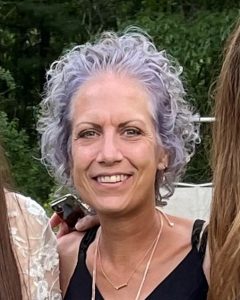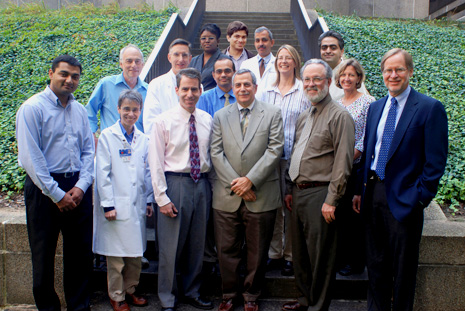On the first morning of Tiffany Patchell’s visit with her dad in Texas in late 2018, she awoke with what felt like a horrible ear infection. Upon returning to Connecticut several days later she visited an urgent care clinic where she was diagnosed with an ear infection and prescribed antibiotics. Her ear continued to bother her and she followed up every few months at the urgent care. The pain then started to extend from her right ear to the right side of her throat and she couldn’t swallow without feeling pain or burning.
She found a new Primary Care Practitioner in March of 2020 who sent her for a CAT scan of the neck. The evening after her CAT scan, she was informed by her physician that she has a tumor growing in the base of her tongue. She was directed to Dr. Jeffrey Spiro, an otolaryngologist who co-directs the head and neck cancer and oral oncology program in the Carole and Ray Neag Comprehensive Cancer Center at UConn Health and specializes in the diagnosis and treatment of head and neck cancer. Patchell was ultimately diagnosed with the high-risk human papillomavirus (HPV) associated with oropharyngeal squamous cell carcinoma in April of 2020.
Oropharyngeal cancer arises in the part of the throat that includes both the tonsils and similar tissue located in the base (back portion) of the tongue. Symptoms can include a persistent sore throat or a painless lump in the neck or earaches. Because the symptoms of oropharyngeal cancer can be non-specific, there may be a significant delay before patients are referred to a specialist. While tobacco and alcohol are major risk factors for mouth and throat cancer, high-risk HPV now causes at least 70% of oropharyngeal cancers.
Oropharyngeal cancer can be treated successfully by surgery alone if diagnosed early but patients are typically diagnosed when it is locally advanced requiring a combination of radiation therapy and chemotherapy (drug treatments). Patchell met with Dr. Robert Dowsett, chief of UConn’s Division of Radiation Oncology, and Dr. Upendra Hegde, a lead medical oncologist treating melanoma and head and neck cancer and co-director of head and neck cancer and oral oncology program at the Carole and Ray Neag Comprehensive Cancer Center. Given the location and extent of her cancer, Patchell was treated with up-front systemic chemotherapy followed by radiation and chemotherapy combination.

Ms. Patchell underwent three rounds of chemotherapy and 35 radiation treatments, five days a week for seven weeks, at the Cancer Center. “Going into radiation every day was hard, but they were always so welcoming and telling me it will be ok eventually,” says Patchell. “I just can’t believe how nice the entire team was.” Treatment of advanced head and neck cancer requires close collaborations between several health care services and providers such as nurses, nurse practitioners, speech therapists, dental surgeons, pain and palliative care nurses, nutritionists, and social workers – truly a multidisciplinary team effort.
Last September Ms. Patchell was told that she was cancer-free.
Like many cancer survivors, Patchell struggles with trying to live the “new” me. She looks different sounds different and feels different although she can’t put into words why or how she feels.
“I know medically I am okay, but I still feel anxious that the cancer may come back,” says Patchell.
“I also struggle with the looks of pity I receive.”
Patchell met with the cancer survivor program members, a post-cancer treatment team at the Cancer Center who provide services to help patients adjust to cancer survivorship. Patients meet with nurse practitioners who review a personalized treatment summary and survivorship care plan to provide a clear follow-up plan for surveillance, information on managing physical symptoms or emotional distress, and health maintenance recommendations. Social workers help patients adjust to their “new normal” by addressing the social, emotional, and spiritual impact that cancer has had and may continue to have on their lives. They provide patients with resources to overcome barriers and challenges. Patients also work with a registered dietician to create individualized counseling to address the unique nutrition concerns of the cancer survivor and physical therapists who provide guidance for exercise plans based on a survivor’s needs and personal preferences by assessing their strength and range of motion and making referrals to specialty care for ongoing therapy.
“Overall, the whole UConn team made me feel like family,” says Patchell. “They all were so caring and nice and truly cared about me and my well-being. I almost miss going there all the time and seeing everyone.”
Her experience has made her more patient and understanding as well as calmer. She almost feels like a happier person now and is more grateful. She has a great support system of family and friends who are there for her and help her through her survivorship.
As noted, Patchell’s oropharyngeal cancer was caused by the high-risk human papillomavirus and this type of cancer can be prevented by timely vaccination against HPV. The HPV vaccine is recommended for individuals 9-26 years old and is most effective when given at ages 11-12. Unvaccinated men and women ages 27–45 can also talk to their doctor about the benefits of the vaccine.



